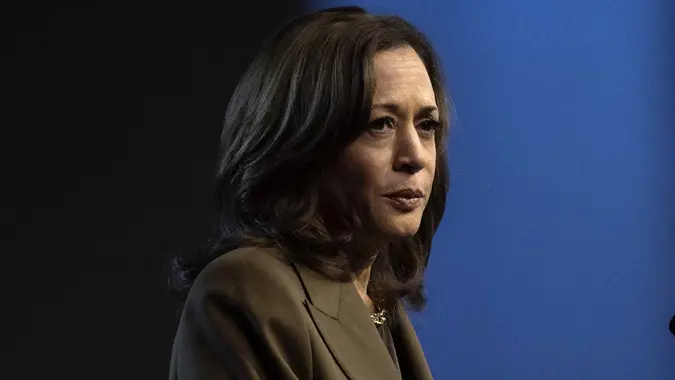4 Challenges You Could Face If Kamala Harris Is Elected and You Plan To Retire in the Next 4 Years

Commitment to Our Readers
GOBankingRates' editorial team is committed to bringing you unbiased reviews and information. We use data-driven methodologies to evaluate financial products and services - our reviews and ratings are not influenced by advertisers. You can read more about our editorial guidelines and our products and services review methodology.

20 Years
Helping You Live Richer

Reviewed
by Experts

Trusted by
Millions of Readers
Kamala Harris’ potential election could affect your retirement savings.
While the vice president’s policies aim to create financial stability and protect consumers, they also might introduce uncertainties when it comes to taxes, healthcare and market regulation.
“Broadly speaking, her proposals [would] have adverse impacts because they respond to the symptoms rather than the root causes of problems in healthcare and housing,” said Wayne Winegarden, an economist with the Pacific Research Institute.
GOBankingRates talked to Winegarden to examine the four challenges you could face if Harris is elected and if you plan to retire in the next four years.
Also see why retiring could be more affordable under a Harris presidency.
Increased Taxes
You could face increased taxes in the next four years if you make $400,000 or more.
Harris has proposed increasing the top individual tax rate from 37% to 39.6% on annual incomes over $400,000 for individuals and $450,000 for joint filers. The tax increases reportedly would affect 3.8 million people, representing almost 3% of all U.S. taxpayers.
She also has advocated for limiting the retirement account contributions for high-income earners with significant IRA balances. Currently, high-income earners can contribute up to $23,000 to their retirement accounts.
If all of Harris’ economic proposals are enacted, high-income earners could have less disposable income and would need to adjust their retirement savings plans.
“Her tax policies [would] be a net negative for the economy,” Winegarden said. “She wants to increase taxes on investment and increase taxes on companies, which harms workers through lower wages. … It [would] also make the tax code more complicated, which is also a negative for future growth.”
Paying More for Worse Healthcare
Harris has promised to make permanent the Biden-era tax credits that she said lower healthcare premiums by an average of $800 a year for millions of Americans. She also has pledged to extend the $35 cap on insulin and $2,000 cap on out-of-pocket spending for seniors to all Americans.
However, Winegarden said Harris’ healthcare policies would shift healthcare costs and offset any potential savings.
“If the government prevents premiums from rising, then the consequences are narrower networks of providers and other restrictions to care that worsen healthcare quality,” Winegarden said. “Ultimately, her proposals [would] either see costs continue to grow, quality to continue to decline or a combination of both.”
Fewer Affordable Housing Options
Harris has promised to build 3 million more affordable rental units and homes to address the nation’s affordable housing crisis. In addition, Harris said her administration would provide first-time homebuyers with up to $25,000 to help with their down payments.
However, Winegarden said Harris’ housing policies, similar to her stance on lowering healthcare costs, respond to the symptoms and not the root causes of high housing costs.
“Subsidizing demand by giving potential homebuyers $25,000 for down-payment assistance, when the market is constrained by supply, [would] have adverse effects,” he said. “The increased assistance [would] cause home prices to rise as retirees and families compete for a constrained supply of housing. The net effect [would] be even higher housing costs and still too little housing.”
Uncertain Impact on Retirement Savings
Throughout her political career, Harris has pursued big corporations. For example, as California attorney general, she sued eBay, alleging anti-competitive hiring practices. If elected president, Harris promises to penalize companies that engage in food price gouging and firms that “hoard available homes to drive up prices.”
However, Winegarden said Harris’ attempts to mitigate the actions of companies who she calls “bad actors” could lead to regulatory uncertainty and diminish incentives for businesses to invest and expand, dampening economic growth.
“It is difficult to imagine that the market [would] perform well in a Harris presidency,” Winegarden said. “Overall, after-tax corporate profits [would] grow slowly, which [would] become a large headwind for the markets. Retirement savings [would] not grow as quickly, meaning that building up the desired retirement nest egg [would] become more difficult.”
Editor’s note on election coverage: GOBankingRates is nonpartisan and strives to cover all aspects of the economy objectively and present balanced reports on politically focused finance stories. You can find more coverage of this topic on GOBankingRates.com.
More From GOBankingRates
 Written by
Written by  Edited by
Edited by 

























